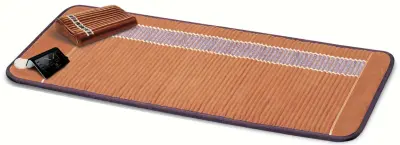How the Biomat Creates Infrared
People often ask how the Biomat creates infrared. It does not use LEDs. It uses a material that generates infrared very efficiently, which is based on NASA technology.

History
In 1967, NASA developed an alumina-silica material that when heated generated a large amount of infrared. In 1982, NASA released a patent on this technology.
In 1990, using this NASA technology, Japanese researchers made a material with alumina, silica, and carbon fiber to generate infrared.
Seven years later, in 1997, Richway International, the manufacturer of the Biomat, used the Japanese material to create the Biomat.
Biomat Layers
The Biomat has 17 different layers. The 11th layer, as shown below, creates the infrared.

- SURFACE MATERIAL: Silicon Urethane with Cotton
- First waterproof layer
- AMETHYST (with Tourmaline) : Transfer to natural Far Infrared Ray
- Hyron Cotton layer for thermal insulation
- Second waterproof layer
- TOCA LAYER: Strong Negative lons and an Magnetic Reaction
- Electric Discharger layer for generating Negative lons
- Copper fabric layer for Electromagnetic Interception
- Carbon Fiber layer for Electromagnetic Interception
- Polyester fiberglass layer
- Tepron Reverse currency heating layer with EMF Interception
- Nonwoven fabric layer for electric blocking
- Aluminium layer for reflecting Infrared Ray
- Nonwoven fabric layer for heat blocking
- Second Hyron cotton layer for thermal insulation
- Polyester sponge layer for thermal protection
- BOTTOM LAYER : High quality cotton with brass pattern
Technology
The material that generates the infrared is a thin metallic sheet. A heating wire is used to heat this material. High-quality sensors are used which feed back to the controller. When the material reaches the set temperature, the power is cut to the heating wire, while the infrared-generating material continues to produce infrared. This is very efficient. When power is not needed for heating, the energy is diverted to generating negative ions electrically through a different system.

